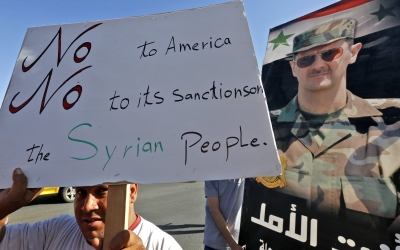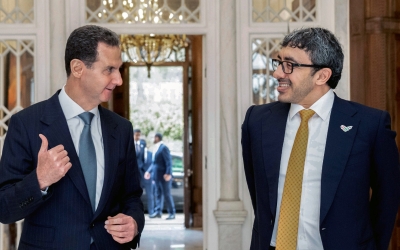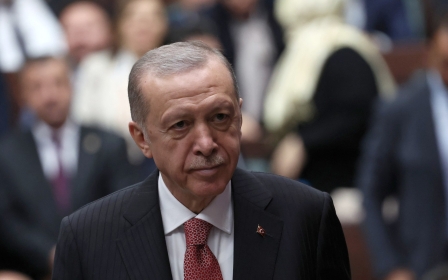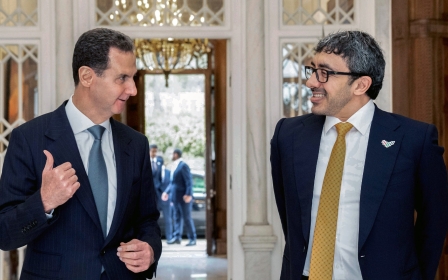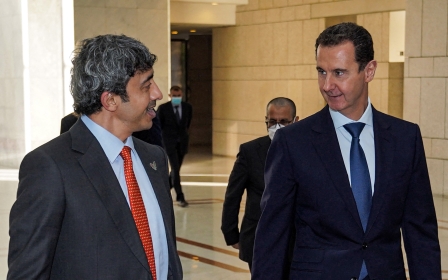Syria’s return to the Arab diplomatic fold is not a top concern for Biden
As the Syrian conflict largely escapes the international media’s radar these days, President Bashar al-Assad’s regime continues to reintegrate into the Arab region’s diplomatic fold.
Since late 2018, a host of regional states have normalised relations with Damascus. The Syrian leader’s visit to the United Arab Emirates in March 2022 was illustrative of how some Arab leaders want Damascus brought in from the cold.
The assessment of countries like the UAE, Bahrain, and Jordan is that it is most pragmatic to reaccept Syria’s government as legitimate and let bygones be bygones
It is still too early to predict how this month's earthquakes in Turkey and Syria will impact the trajectory of Syria’s reintegration into the region. Yet, it is reasonable to consider that, under the guise of more effectively coordinating assistance to Syrian victims, some regional governments will argue that normalising relations with Assad and working more closely with his government is necessary on humanitarian grounds.
Those in the Arab world who have renormalised relations with Syria will also likely join calls on the West to ease sanctions (beyond what the Biden administration has already done) to help vulnerable Syrians - 90 percent of whom were in poverty prior to this month’s earthquake, which led to up to 5.3 million Syrians needing shelter.
New MEE newsletter: Jerusalem Dispatch
Sign up to get the latest insights and analysis on Israel-Palestine, alongside Turkey Unpacked and other MEE newsletters
On 12 February, the UAE’s foreign minister, Sheikh Abdullah bin Zayed, met with the Syrian president in Damascus. As the first high-ranking foreign official to meet with Assad following the earthquake, the UAE’s top diplomat sent a strong message of support to the Syrian government from Abu Dhabi.
The king of Bahrain, which renormalised diplomatic relations with Syria at the same time as the UAE in late 2018, was quick to express support for the Syrian people while offering condolences to Assad in the disaster’s immediate aftermath.
A pragmatic choice
The assessment of countries like the UAE, Bahrain, and Jordan is that it is pragmatic to accept Syria’s government as legitimate again and let bygones be bygones. An argument made by some Arab officials has been that Syria is more likely to gain a degree of autonomy from Iran if Arab states restore relations with Assad’s government.
Yet this regional trend towards rehabilitating the regime in Damascus does not sit well with Washington. US lawmakers have condemned it as "shameful". Like Donald Trump’s administration, President Joe Biden opposes Washington’s partners in the Middle East and North Africa (Mena) normalising ties with Assad.
The Biden administration has repeatedly made this stance clear. Last month, State Department spokesperson Ned Price reaffirmed that Biden's team is against countries of the region "upgrading their relations or expressing support to rehabilitate the brutal dictator Bashar al-Assad".
Following the Turkey-Syria earthquake, Price emphasised that this disaster will not prompt team Biden to reassess its position that Assad’s rule is illegitimate. "It would be quite ironic, if not even counterproductive, for us to reach out to a government that has brutalised its people over the course of a dozen years now," declared Price. "Instead, we have humanitarian partners on the ground who can provide the type of assistance in the aftermath of these tragic earthquakes," he added.
However, the US will probably avoid taking concrete actions to prevent Arab countries or Turkey from reconciling with Damascus. Although the White House will call on regional actors to avoid such rapprochements, there is no reason to expect Washington will use other cards such as restricting arms sales or imposing sanctions to disincentivise these states from normalising diplomatic relations with the Syrian president.
Caesar sanctions
The Caesar Act is Washington’s most powerful form of leverage for influencing Syria’s relationships with fellow Arab countries. Implemented by the Trump administration in 2020, the Caesar Act not only imposes crippling sanctions on Syria, but also punishes third parties from trading or doing business with the war-torn country.
Biden has kept the Caesar Act in place, essentially preventing Arab states from developing economic relations with Syria in ways that could help the impoverished country redevelop. Indeed, it appears that preventing Syria’s reconstruction with Assad in power has been a US goal under both Trump and Biden.
"The stance of the US implies that Syria must not be rebuilt after the war," Juan Cole, a professor of history at the University of Michigan, told this writer.
He added: "US sanctions harm innocent Syrian civilians and have no hope of overthrowing the Assad regime. It is the stance of a spoiler, not that of a responsible world power. It is in no one's interest that millions of Syrians live in misery and are prevented from undertaking a post-war recovery. Broad country sanctions are too blunt a tool if the goal is to punish al-Assad and his cronies."
Despite the Caesar Act exacerbating the human suffering across Syria, some critics of Biden’s approach to Syria maintain that his administration has been too soft in terms of enforcing these sweeping sanctions. At the start of this year, a senior Republican congressional staffer told Al-Monitor that the GOP-dominated House will put more pressure on Biden to step up enforcement of the Caesar Act.
One day after the Biden administration issued a six-month exemption on sanctions for humanitarian aid bound for Syria, some Republicans expressed outrage. House Foreign Affairs Committee Chairman Michael McCaul and Senate Foreign Relations Committee Ranking Member James Risch released a statement alleging that the waiver permits "direct transactions with the Assad regime" and "opens the door to the regime pilfering aid and will be abused to create a pathway for normalising relations with the Assad regime. Additionally, this licence doesn't need to last six months, when other disaster relief licences usually only last a few weeks."
However, whether Washington would penalise entities in the Gulf or elsewhere in the Mena region for violating US-imposed sanctions on Syria is an open question. "It remains to be seen whether or not the United States would enforce the Caesar sanctions law on an ally like Turkey or the UAE, should either of them ever have entities that begin to do business in Syria," said Ryan Bohl, a Middle East and North African analyst at the risk intelligence company Rane, in an interview with this writer.
"They don't seem willing to preemptively carry out sanctions threats against allies that seem prepared to establish economic ties with Damascus," he added.
In any event, the Caesar Act does not stand in the way of shoring up the perceived legitimacy of the Syrian regime through diplomatic moves and symbolic gestures that do not involve business, trade, or economic dealings. These include reopening embassies in Damascus, hosting Syrian regime delegations, and issuing pro-Assad rhetoric.
Washington’s priorities
According to some experts, the Biden administration does not care too much about Gulf Cooperation Council (GCC) members, Jordan, or Turkey normalising diplomatic relations with Assad’s government. And Washington will not alter bilateral relations with such countries because of them warming up to Damascus. The main reason why pertains to Washington’s priorities.
The foreign policy focus of Biden’s administration is on shoring up Nato unity against Russia amid the conflict in Ukraine, countering China, and addressing the Iranian nuclear file.
"Syria right now is very low on the totem pole in terms of priorities for US Middle East policy," Nader Hashemi, the director of the Center for Middle East Studies at the University of Denver's Josef Korbel School of International Studies, told this writer. "Now that ISIS has been defeated, what happens in Syria really doesn’t concern the Biden administration. Biden has his hands full with other foreign policy crises."
'Syria right now is very low on the totem pole in terms of priorities for US Middle East policy'
Other analysts agree that the Biden administration lacks commitment to taking actions that could possibly prevent Assad’s government from being further reintegrated into the Arab world’s diplomatic fold.
"I think [US officials] want to make life difficult for Bashar al-Assad, but I’d be surprised if it’s at the top of the talking points when American diplomats go to meet their counterparts," Dave DesRoches, an assistant professor at the National Defense University in Washington, told this writer.
From the White House’s perspective, the continuation of Assad’s presidency does little to undermine US interests. "There is a realisation that the Assad regime is a monumentally weak and corrupt [government] that can barely survive,” added Hashemi. Bohl thinks that the Biden administration is "content to take a back seat to normalisation of diplomatic processes with Syria".
No negative consequences
Ultimately, the Biden administration lacks a coherent foreign policy towards Syria. DesRoches called the Syria file a "wicked problem that the US is just not well-equipped for dealing with". He added: "What we’ve seen are statements of hopes and concerns that if we leave bad things will happen, but preventing bad things from happening is not the same thing as a strategy."
DesRoches further warned that using coercive measures to pressure Arab states into not reconciling with Damascus could backfire against Washington’s interests.
He maintains that the Biden administration’s most realistic option for preventing Assad from being further rehabilitated is through dialogue, and that officials in Washington must hold discussions with their security partners in the Arab world about the pros and cons of rapprochements with Assad.
"The United States ultimately is the guarantor of security for much of the Mena region and is the guarantor of free trade and passage, but for us to impinge upon that, or to even try to use that as leverage, cuts into our credibility and undermines our overall strategic positioning.
"I think this is an opportunity for good old fashion persuasion and the persuasion should start with ‘what are your interests’ and move forward from there. If you’re not an adjacent country, if you’re not under the threat of another flood of refugees, I don’t see a reason [to] work towards normalising relations with Syria," added DesRoches.
Although Syria will probably remain a low priority for the White House in 2023, Assad’s regional standing looks to be a point of contention between Washington and some of its close Arab partners, as well as Turkey.
As sovereign countries, a host of Mena states are disregarding calls from the White House to not rehabilitate the Syrian dictator. Even though many of these regional governments spent years sponsoring militias fighting to topple the regime in Damascus, the reality is that the UAE, Jordan, Bahrain, and other regional actors do not believe that Washington-backed efforts to keep Assad weak and isolated serve their national interests.
This overall trend towards normalisation with Damascus highlights how states such as the UAE are increasingly confident to pursue their own interests in ways that do not always align with US foreign policy’s interests.
The fact that Washington will probably not use its leverage to dissuade Arab regional partners from normalising with Syria only emboldens them to continue being increasingly cordial with Assad without worrying about the negative consequences of rehabilitating his regime.
The views expressed in this article belong to the author and do not necessarily reflect the editorial policy of Middle East Eye.
This article is available in French on Middle East Eye French edition.
Middle East Eye delivers independent and unrivalled coverage and analysis of the Middle East, North Africa and beyond. To learn more about republishing this content and the associated fees, please fill out this form. More about MEE can be found here.




